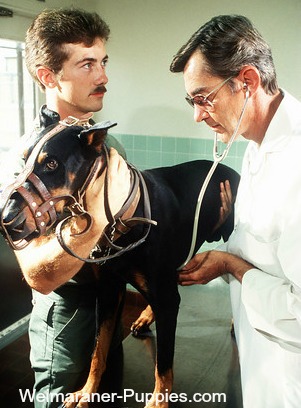Puppy vomiting can happen suddenly. You have read about puppies and thought you were prepared. But now you have a little Weimaraner puppy vomiting! What should you do?
The good news is that most puppy vomiting is harmless and not an indication of a more serious disease. However, with puppies, you should not take chances.
Puppies have fewer reserves than older dogs and they can quickly go downhill and end up in an emergency situation.

This article will discuss these topics:
- Did you do something wrong?
- Why do puppies vomit?
- Is it vomiting or regurgitation?
- When Vomiting is a Serious Symptom
- What to do if Your Puppy Starts Vomiting
- Cleanup for a Puppy Vomiting
Did you do Something Wrong?
Most likely you are not doing anything wrong. Puppies have a tendency to get into anything and everything, and you can’t know everything your dog has done or even what he’s eaten.
Weimaraner puppies often have access to fun things to eat out in the field, in addition to those inedibles at your home.
The best thing that you can do is observe your puppy and try to understand what she may be doing to cause the vomiting. When your puppy vomits, it’s called gastritis.
The first thing you’ll probably notice is that your puppy isn’t eating. Her appetite is gone and she has become really quiet.
Next, you’ll probably notice that she is drooling and slobbering a lot. And then the heaving and vomiting start…
Why Do Puppies Vomit?
There is no single reason why puppies vomit. And no two puppies are ever the same, even if they came from the same litter.
I’ll list the most common reasons for puppy vomiting, and perhaps you’ll figure out why your Weimaraner puppy has had a problem.
Eating too Fast
Most puppies eat faster than we do. In fact, your Weimaraner might be finished her meal even before you leave the room.
Your dog’s instincts are to finish her food before anyone else can eat it. Of course this is not exactly great for digestion, and your dog may end up vomiting her last meal.
If your dog eats too fast, you can easily slow her down with a slow-feeder bowl. The bowl has ridges and valleys that hold the dog food. Because it is not as easy to grab a large amount and gulp it down, your dog will eat more slowly.
If your dog vomits right after eating, he may be eating too fast. Or perhaps he is exercising too quickly after a meal.
If your Weimaraner is eating too fast, you do need to address this, as Weimaraners are prone to bloat, which can be life-threatening.
Sensitive Stomach
Some puppies just have a sensitive stomach, no matter what they eat. In this case, a little help with digestion could be in order.
Probiotics can help keep your puppy’s digestive system healthy and working well. PetVitality has a probiotic chew that dogs think are treats. If you prefer a powder to put on your dog’s food, Doggone Best has a probiotic powder that people like.
Anxiety or Nervous Dog
Your puppy may be a naturally nervous or anxious dog. In fact, many Weimaraners are high strung. Even a dog who is not usually nervous, can get himself worked up over a trip in the car or a trip to the vet.
If your puppy seems anxious, you might want to try a natural product that helps calm him, like Zesty Paws Calming Chews. These are especially good to use if your puppy is anxious once in a while on specific occasions.
Another approach to help your Weimaraner puppy calm down is to use a Thundershirt. The shirt is calming to a nervous dog, and it even can help dogs that are anxious about thunderstorms or dogs that have separation anxiety.
Puppy Worms
Most puppies do get worms at one time or another, and Weimaraners are no exception.
Hunting dogs, even in training, are exposed to wild animals’ or other dog’s feces, which may contain worms.
If your puppy has worms, she could vomit as a symptom. You may even see worms in the vomit.
Your vet can do tests on your dog’s stool and help you decide if this is the problem.
Eating Something that isn’t Food
Puppies love to explore everything around them. And guess what! One of the ways that puppies explore is by putting things into their mouths.

And puppies sometimes do eat things that aren’t food!
Your Weimaraner can get sick after eating poop (his own or someone else’s), plants, chemicals, string, or garbage. None of these things are especially healthy, and they can all make your puppy vomit.
By the way, if your dog eats something toxic, it is Nature’s way to get rid of it quickly, by having your puppy vomit.
Diet is Not Sufficient for Your Puppy
You do want to make sure that your dog is getting a good quality dog food. Weimaraners are high energy dogs and they require good nutrition.
A poor diet can cause digestive upset in your dog.
Infectious Bacterial or Viral Disease
Just like you can, your Weimaraner can pick up a gastrointestinal virus or infection. And she’ll vomit, just like you.
Most of the time, if your dog has picked up an intestinal infection, it will pass in a day or two.
Stress
Some Weimaraners are just more high strung than others. And if your dog tends to be anxious about new things and places, she may have a nervous stomach.
When puppies suffer from separation anxiety (whether you are away or just in another room at bedtime), they can work themselves into a state where they vomit.
Vaccinations
When your puppy is vaccinated, he may vomit as a side effect of the vaccination. Do keep an eye on your puppy after each vaccination, to make sure that she does not have a reaction.
If she has a reaction to a vaccine, the symptoms can get more severe in later vaccinations. You may want to speak to your vet about giving your puppy a small amount of antihistamine before each vaccination.
Is it Vomiting or Regurgitation?
Vomiting is forceful. The food, fluid or other matter that was eaten is forcefully ejected from your dog’s stomach and upper intestines.
You usually have a warning before this happens, although it may not be very long before your dog actually vomits. Your puppy may drool, retch or have contractions in her stomach.
On the other hand, regurgitation is a passive motion. And the material that is brought up is undigested. When your dog regurgitates something, he may also have trouble breathing and may be coughing.
If you find that you need to speak with your vet, observe your puppy to make sure that you can explain whether she is vomiting or regurgitating her food.
When Vomiting is a Serious Condition
Usually if your puppy has eaten something nasty and then thrown it up, he will be back to normal quickly. And if your pup vomits and then recovers within 24 hours, he’s probably just fine.
Chances are that he ate something that didn’t agree with him, and it’s gone.
However, if the vomiting persists, you may want to consider taking your Weimaraner puppy to the vet. Long term or severe vomiting can be a sign of a more serious illness. In some breeds, for example, it is a symptom of pancreatitis.
In puppies, vomiting can also be a sign of canine parvovirus. We see parvo in puppies and in older dogs who were not vaccinated. If your vet suspects this, she will do a fecal or blood test to confirm the diagnosis.
But, with puppies, usually the most serious problem is dehydration. Puppies can get dehydrated quickly, if they continue to vomit.
What to do when Your Puppy is Vomiting
Since most cases of puppy vomiting are over quickly, the solution is simple. You need to withhold food until your puppy has stopped vomiting, for about 8-12 hours, up to 24 hours. This will give his digestive system some time to rest and recover.
You’ll need to see how your puppy does. If she stops vomiting and seems to be more settled, you can give her some food after a few hours. This is a judgment call. You just need to give her intestinal system a rest before your puppy eats again.
Water is another story. Vomiting can lead to dehydration, so you do want to make sure that your little Bichon is able to drink water from his bowl. Make sure he gets small amounts of water. And, you might try getting some liquids into him by giving him an ice cube or two.
When your puppy has not vomited for a while, you can start by giving him a little cooked rice or canned pumpkin. Both are easy to digest and soothing to the intestines.
If that goes well, you can transition back to your puppy’s regular puppy food.
Cleanup for a Puppy Vomiting
Even though your heart goes out to your suffering puppy, you’ll still need to address the mess he’s making.
Vomiting is not like housebreaking a puppy. You can’t teach your puppy to vomit outside. And she certainly can’t “hold it” until it’s more convenient for you.
So you will be left with a mess to clean up. It’s disgusting and it smells. So you’ll need something that gets rid of any stains and odors and that will neutralize any bacteria or viruses.
Make sure you use a product like Bubba’s that has enzymes that keep on working, long after the unfortunate incident is cleaned up. You do need to make sure that the odor is not just covered up, as your dog may return to mark his territory where he can still smell an odor.




Leave a Reply